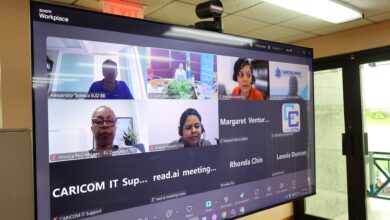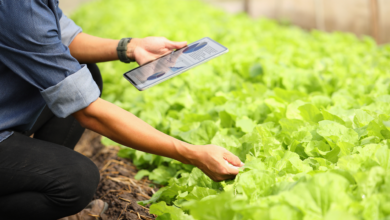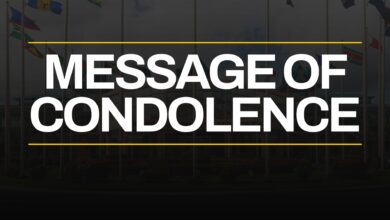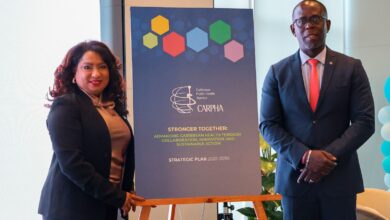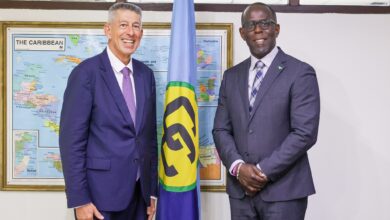My sincere thanks are extended to the Secretariat and the Secretary General for inviting me to speak at this Opening Ceremony. It is always wonderful to be in Guyana – the country of my birth – and I thank you for affording me an opportunity to visit. The pleasure is even greater as the training programme that begins today represents in so many ways, the raison d’être of the Caribbean Community and the University of the West Indies. It brings together institutions, peoples and skills in the spirit of sharing information and knowledge for the greater good of this region that we serve. I am very pleased that the UWI through our Institute for International Relations is intimately involved in the delivery of this programme which is being held under the theme “Preparing for the Future,” and I applaud Professor Tim Shaw and his team for this effort. This type of collaboration is one that the UWI supports wholeheartedly and I look forward to more of this taking place in the future in other areas of capacity building.
I am delighted to note the robust participation from around the Region. You are our future ambassadors and will be representing our interests in spheres of power around the world. Our investment in you represents an investment in our collective fortunes in years to come. Our current economic circumstances may not be the best, but there are some investments that must be made to secure our place in the global arena for the future.
That immediate to mid-term future as currently perceived from this part of the world is one filled with challenges. Before the still-unfolding global economic and financial crisis was being felt in north, the Caribbean was already dealing with challenges on several fronts. We were facing the removal of preferential trading arrangements, negotiating difficult new trading arrangements with traditional partners and in discussions with non-traditional partners as to how best the Region could attain and maintain a viable foothold in the global trading arena. We were already addressing questions of regional governance; grappling with the problems of crime and security fuelled by trade in illegal narcotics and arms, that are affecting the entire Region; attempting to stem the outward flow of our best and brightest graduates to OECD countries (where they do make a significant contribution); addressing issues of climate change affecting our small island and low-lying states; developing functional cooperation modalities to facilitate a “Community for All”, and working towards developing a development vision and a regional strategic development plan. We already have a full plate without the imposition of uncertainty as a result of a global recession.
Given those challenges (and others), our diplomats must be fully cognisant of the Region’s position on these matters and of the particular needs of our countries, individually and collectively and be prepared to advocate for that position or positions as the case may be. It is not unusual for varying positions to be held by different countries within our Region with regard to external relations or even our own internal relations. However, a skilled diplomat is one who will be able to manoeuvre delicately between varying positions and emerge with a position where everyone feels that they have “won.”
Three qualities that have been suggested as critical for success as a diplomat are patriotism, language skills and an ability to adapt. Patriotism must be supported by eloquence and both must be underpinned by the diplomat’s ability to assess a situation and make it work to his or her country’s advantage.
What will be important as you proceed through your careers, is that you keep foremost in your thoughts, the people that you represent. Not just your governments but the people that they themselves represent. However striking the delicate balance between national or regional interests and the interests of individual sectors or groups, is not an easy task and I am not in any way offering a solution. That task I will leave to the distinguished presenters from whom you will hear during the course of the next two weeks.
From what I’ve heard, quite a bit of what Diplomats have to do is not as glamorous as some would think! It can be quite time consuming, tedious and boring, and how exciting, interesting and rewarding it will be, will depend largely on you. Indeed, former US Ambassador to the United Nations, Adlai Stevenson is attributed with the quote that “A diplomat’s life is made up of three ingredients: protocol, Geritol and alcohol.” So, in addition to cocktails, meetings and ceremonies, advocacy, there will be the mundane consular activities such as attending to the needs of the diaspora, preparing numerous briefs for your respective Ministries, and many other tasks that I cannot begin to enumerate.
Given the current global situation, one of the things that you will have to be very mindful of when you are posted overseas, is seeking out opportunities for your country and your Region. Funding from non-traditional sources has become a mantra for us at the UWI. Jamaica’s High Commissioner in Ottawa, Her Excellency Evadne Coye, has been doing a marvellous job at identifying scholarship opportunities for students from the Caribbean. She has been an exemplary advocate for our Community and her interventions with the Department of Foreign Affairs and International Trade in Ottawa have resulted in several of our students – from across the campuses – going to Canadian Universities for a few months to a semester. Of course, what we at the UWI would wish to see, is more students from the diaspora and from extra-regional mainstream communities coming to the Caribbean, to the UWI and other institutions, to do various programmes. One of the areas of our current Strategic Plan is the internationalisation of our programmes and we have been working toward promoting our university outside the Region. We have been leaders among universities in the ACP countries winning awards from the EU under the Edu Link programme but I believe that with help from our diplomatic community and other representatives we could be winning much more from the EU
Advocacy for the Caribbean, our programmes, our development, our people, our industries, will be a major part of your function. You also have to keep your ears to the ground for opportunities to promote the region or for opportunities that may be advantageous to the region in various ways – trade, politics, culture, educational opportunities, to name just a few….. The UWI, through the graduate programmes offered at the Institute of International Relations and our undergraduate programmes in International Relations offered through the Faculties of Social Sciences has been preparing the “ground-work” for our representational corps. I am sure that some of you, if not most of you are graduates of our programmes, and we welcome your feedback on how we can improve those programmes to meet the changing needs of our diplomats. While the basic skills – and those include the so-called “soft skills,” may not change significantly, as global imperatives and poles of power shift, the nuances of the major issues that have to be addressed, may also change and you have to be sensitive to those.
The UWI is committed to working with our partners such as the CARICOM Secretariat, the Commonwealth Secretariat and other regional and international agencies, to equip you with the “hard” training that will prepare you for that battle-ground as it could be. We also want to ensure that you have the “soft skills” – social, networking, cultural sensitivity, etc., and we want to provide ongoing training such as this two-week programme, to ensure that you are kept abreast of changes that are taking place within the field of diplomacy and to ensure that your skills are continuously honed to be our best representatives.
I mentioned networking briefly, but would like to reiterate that in your field, it can be one of the most important skills and strategies that you deploy to ensure your success as your country’s representative. This group, with whom you will spend the next two weeks, discussing current issues, delving into reasons why and why not, preparing reports and taking them apart, reflecting on where the Caribbean Integration Movement has reached at this point in history, is the group with whom you will have the collective responsibility over the next two decades (or more) for your country and this region’s presence in external arenas. Get to know each other. Maintain contact after this seminar. At another time in your lives, being able to call on fellow Ambassadors for assistance, advice or support may be the deciding factor on which our future as individuals and a Community of nations depend.
My very best wishes for a wonderful two weeks!

